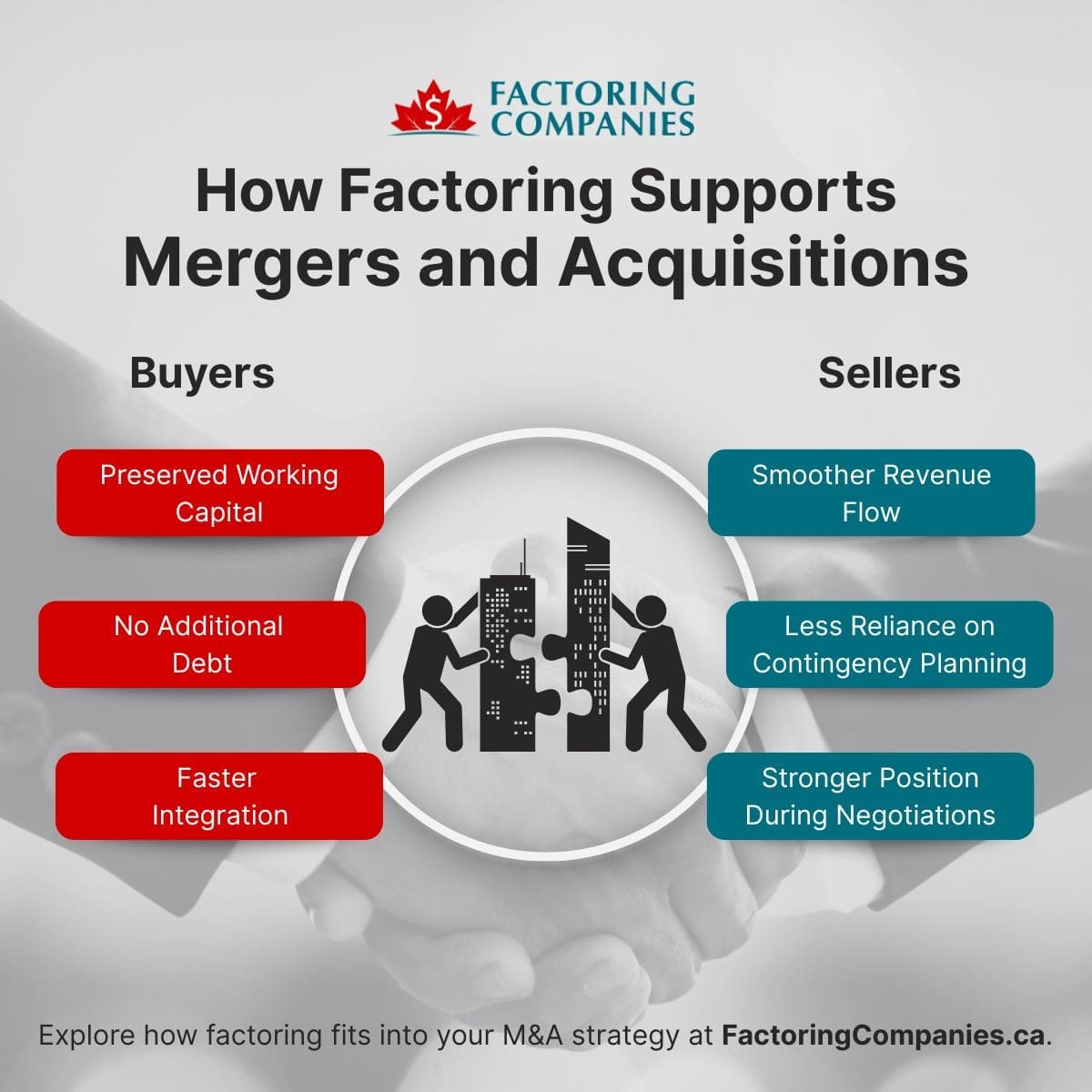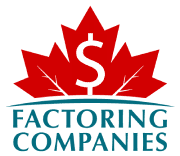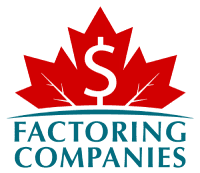
More than 1,500 Canadian companies are sold every year, with the average deal sitting around $6 million, according to Kroll. Regardless of which side of the table you’re on during negotiations, chances are your business will need some financial support. In this guide, we’ll explore why that happens and why more businesses are turning to factoring for mergers and acquisitions today.
Mergers and Acquisitions Put Pressure on More Than the Balance Sheet
When small and mid-sized businesses explore a merger or acquisition, it’s usually a sign of growth or transition. You might be looking to expand into a new region, take on a competitor, or create an exit plan after years of hard work. On paper, the process looks strategic, and it is, but the reality is often more demanding than expected.
The M&A Process is Heavy on Timing, Coordination, and Detail
The steps typically include:
- Early Discovery and Fit: Determining whether both businesses align in values, vision, and operational capabilities.
- Due Diligence: A deep review of contracts, financials, customer records, compliance history, and internal processes.
- Valuation and Negotiation: Deciding what the business is worth and how to structure the deal.
- Transition Planning: Outlining who will run what, when, and how the teams, tools, and relationships will shift hands.
The deal doesn’t press pause on the rest of your business. While you’re working through the details, the day-to-day still needs your attention. Clients need support, teams need direction, and operations keep moving.
Timing and Stability Matter for Both Sides
It’s easy to assume M&A pressure falls mostly on the buyer, but that’s rarely the case. In reality, both sides are juggling competing priorities.
For Buyers
- Operational Continuity: You still need to deliver on existing obligations while preparing for post-acquisition changes.
- Decision Bottlenecks: Any delay in information or responsiveness can stall the entire process.
- Cultural and Process Fit: Even if the financials make sense, misalignment in how the businesses operate can slow integration planning.
For Sellers
- Sustaining Business Performance: The business needs to run smoothly during due diligence to protect valuation.
- Managing Staff and Client Expectations: Most owners keep the deal under wraps until the right moment, but maintaining morale and service levels in the meantime requires effort.
- Supporting the Transition: Many deals include post-sale handover periods where the seller continues to play a role, requiring them to stay deeply engaged.
The Process Can Get Tangled
Deals can drag on longer than expected. Integration plans might get complicated. Teams can lose focus. And the longer it all takes, the harder it becomes to maintain momentum on both sides.
That’s where things start to fray, not necessarily because the deal is wrong, but because the process places a heavy burden on operational bandwidth, leadership focus, and timing.
Businesses Can Create Breathing Room During an M&A Deal

The demands of a merger or acquisition can stretch a business thin. While negotiations unfold, daily operations continue. This level of strain can lead to disruptions that weaken the perceived value of the business and complicate the deal.
To stay on track, many businesses take proactive steps to create breathing room during this phase.
Prioritizing Core Functions
Leadership teams often narrow their focus to protect essential operations. Growth continues, but the focus shifts to areas that directly support stability and deal success.
- Clear Operational Boundaries: Strategic projects that can wait, do. Attention shifts to business units that directly impact value and stability.
- Delegation to Trusted Managers: Key decision-makers remain close to the deal. Daily oversight is distributed to leaders with deep knowledge of internal workflows.
- Process Tightening: This is often a natural byproduct of due diligence. Businesses use the opportunity to eliminate inefficiencies before they complicate integration.
Preparing for Due Diligence Demands
Even when the deal is progressing smoothly, due diligence introduces a constant stream of information requests and follow-up questions. Delays here can stall momentum or raise concerns.
- Financial Visibility: Well-prepared companies have updated balance sheets, income statements, and cash flow reports readily available.
- Contractual Clarity: Client, vendor, and lease agreements are reviewed and organized to support valuation and buyer confidence.
- Human Resources and Compliance Documentation: Clean, complete employee records and documented compliance policies reduce the risk of late-stage friction.
Maintaining Stability and Confidence
While the transaction progresses, the business must continue to operate as though the deal may not close. That level of resilience sends a strong signal.
- Consistent Performance Metrics: Revenue, margins, and productivity are monitored closely. Irregularities, however minor, can raise red flags during negotiations.
- Team Communication: Key staff are often looped in to maintain transparency and ensure continuity, even under confidentiality constraints.
- Reputation Management: Client and partner relationships are actively maintained to preserve goodwill through the transition.
Factoring Can Help Support Cash Flow and Protect Valuation During the M&A Process
Factoring plays a focused role in helping businesses navigate the timing pressures that come with a merger or acquisition. It supports day-to-day operations during the transition by providing access to capital tied up in receivables, without adding debt, giving up equity, or waiting through lengthy approval cycles. For business owners on either side of the deal, that kind of flexibility can strengthen negotiating power and help keep the process moving.
For Buyers, Factoring Supports Cash Flow Without Slowing Momentum
Buyers often face competing financial priorities. The business needs to maintain service delivery, meet payroll, and fund integration planning, all while absorbing acquisition costs. Factoring offers liquidity without redirecting capital.
- Preserved Working Capital: Instead of tying up cash in unpaid receivables, factoring allows you to unlock that value and redeploy it immediately.
- No Additional Debt: There’s no loan to repay and no interest to accrue. That keeps your balance sheet cleaner, which may be important depending on how the acquisition is being financed.
- Faster Integration: With accessible cash, buyers can move more quickly on transition plans, from onboarding new staff to aligning systems and processes.
For Sellers, Factoring Stabilizes Cash Flow to Protect Valuation

Sellers are often under pressure to maintain strong, consistent performance throughout the transaction window. Even minor disruptions can affect valuation or introduce uncertainty for the buyer. Factoring gives you more control over timing and cash availability.
- Smoother Revenue Flow: Instead of waiting weeks or months for clients to pay, you can accelerate receivables and keep operations running at full speed.
- Less Reliance on Contingency Planning: With steady cash flow, sellers are less likely to need short-term loans or capital injections during the final months of ownership.
- Stronger Position During Negotiations: A well-capitalized seller is harder to pressure. It signals stability, which supports both price and terms.
There Are Many Benefits to Leveraging Factoring in Transitional Periods
Factoring is particularly effective in M&A scenarios because it is:
- Flexible: You can factor selected invoices or clients based on your needs.
- Responsive: Most approvals happen quickly, often within a few business days.
- Scalable: As revenue grows or the deal progresses, access to funds grows with it.
Protect Your M&A Strategy with Factoring
Deals fall through for all kinds of reasons. Cash flow doesn’t need to be one of them. When used well, factoring gives you the breathing room to manage the present while shaping what comes next. If you’d like to explore how factoring fits into your M&A strategy, request a complimentary rate quote.
FAQs on Factoring for Mergers and Acquisitions
Can I use factoring to help fund post-merger integration costs?
Yes. Factoring can generate working capital to cover integration expenses such as new hires, systems alignment, or legal support. Because it accelerates cash already earned, it offers flexibility without requiring loans or new investment, critical when expenses rise before new efficiencies or synergies take hold.
What role does factoring play in stabilizing revenue before selling a business?
Factoring helps smooth out irregular cash flow caused by client payment delays. This stability makes your financials easier to present during due diligence, protects your valuation, and reduces the chance of last-minute concerns from the buyer related to liquidity or operational consistency.
Should I start factoring receivables before putting my company up for sale?
In many cases, yes. Starting early gives you time to demonstrate consistent cash flow and improve working capital ratios, both of which support stronger valuation. It also helps prevent service or payroll disruptions during the sales process, keeping the business stable through due diligence.
Is factoring a red flag for buyers during due diligence?
Not necessarily. If well-managed, factoring is seen as a strategic cash flow solution, especially when it's clearly supporting growth or operational stability. Transparency is key. Buyers will want to understand the structure, terms, and how the relationship impacts accounts receivable and client relationships.
Can factoring help buyers preserve working capital during an acquisition?
Yes. Buyers can use factoring to unlock funds from acquired receivables or their existing book of business. This creates flexibility for covering integration costs, retaining key staff, or responding to new opportunities, without relying on additional debt or tying up capital needed elsewhere.
How does factoring affect business valuation in an M&A?
Factoring can have a positive impact by supporting stable, predictable cash flow. Buyers often favour businesses with clean financial records and strong working capital positions. However, the terms of the factoring arrangement, such as fees or client concentration, will be factored into overall valuation assessments.
Are there risks to factoring during a merger or acquisition?
Yes, but they are manageable. Some buyers may be unfamiliar with factoring and require additional explanation. It's also important to avoid overly restrictive contracts that complicate transitions. Working with a factoring company that understands M&A dynamics helps minimize disruption and aligns with your deal goals.
Can I continue factoring after my company is acquired?
Often, yes. But it depends on the terms of both the sale and the factoring agreement. Some buyers opt to maintain factoring to support working capital during the transition, while others may choose to replace it with internal financing. Early communication with both parties is essential.
Do buyers typically keep existing factoring arrangements in place post-sale?
It varies. Buyers who prioritize stability may retain factoring during the integration period, especially if the agreement is flexible and cost-effective. Others may transition to a different funding structure once systems are aligned. What matters most is ensuring continuity while the new structure takes shape.

About Factoring Companies Canada
Related Insights
Get an instant factoring estimate
Factoring results estimation is based on the total dollar value of your invoices.
The actual rates may differ.
CLAIM YOUR FREE FACTORING QUOTE TODAY!
PREFER TO TALK?
You can reach us at
1-866-477-1778
Get an instant factoring estimate
Factoring results estimation is based on the total dollar value of your invoices.
The actual rates may differ.
CLAIM YOUR FREE FACTORING QUOTE TODAY!
PREFER TO TALK? You can reach us at 1-866-477-1778











